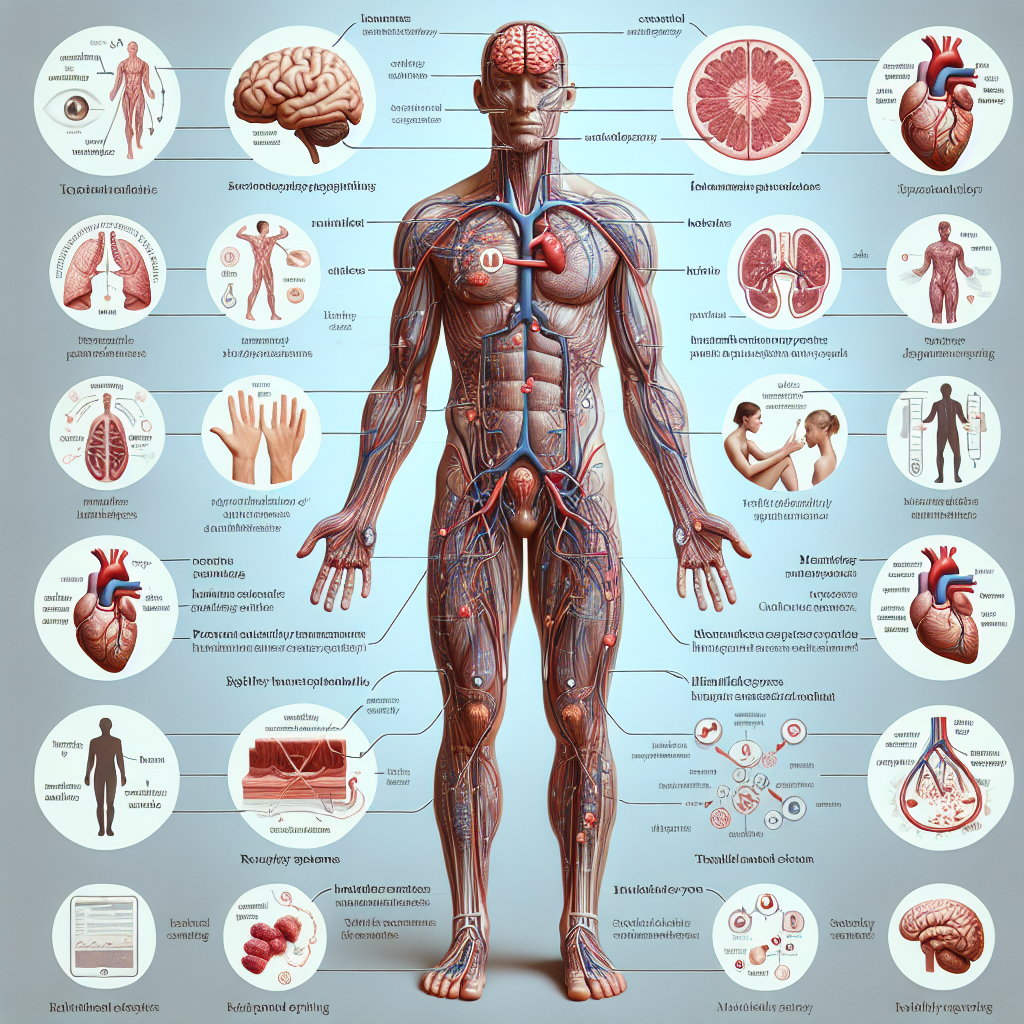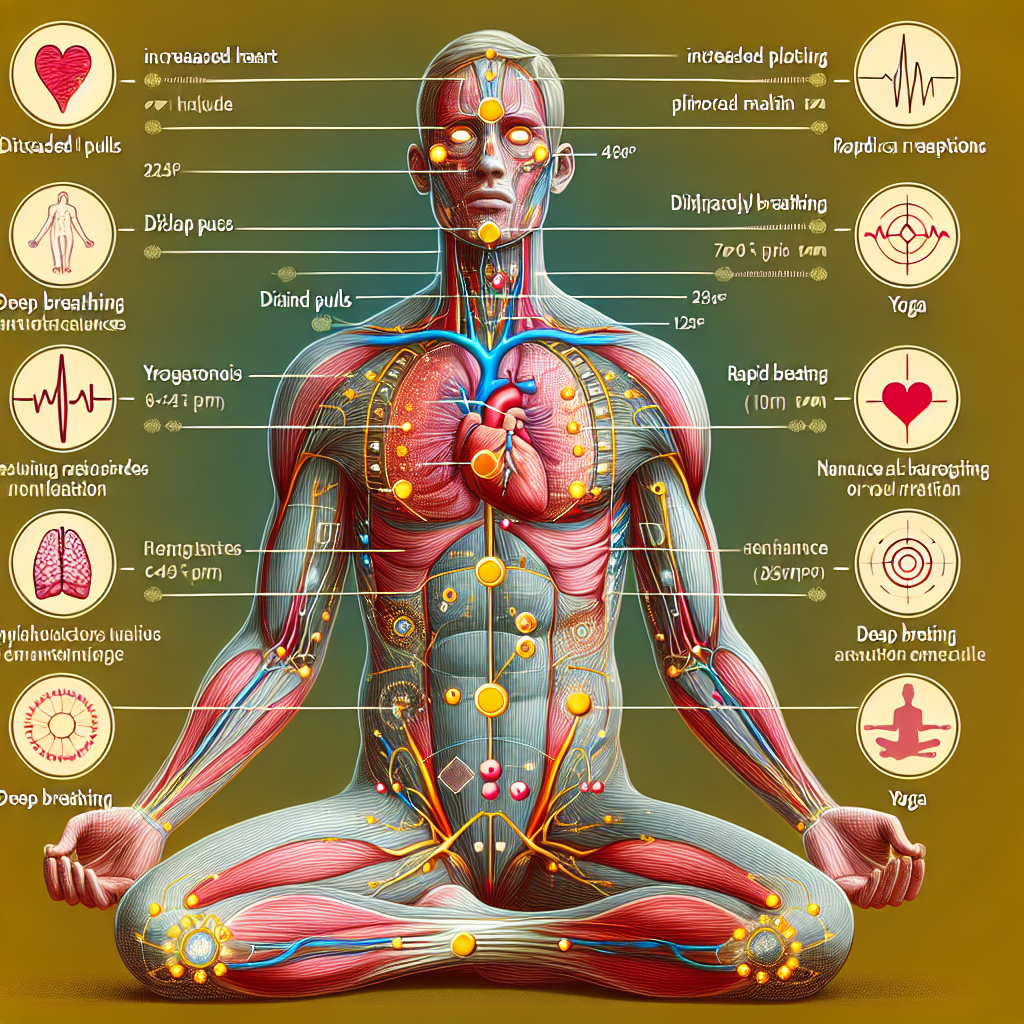How Your Body Responds to Stress—And What to Do About It

Discover how your body responds to stress and learn effective strategies to manage it. Empower yourself with knowledge and take control of your wellbeing today. Visit My Vibrant Vitality now.
Understanding the Physical Impact of Stress on Your Body
Stress is an inevitable part of life. It is a natural response to the challenges and demands we face daily. However, when stress becomes chronic, it can have a significant impact on our physical health. Understanding how your body responds to stress and learning effective ways to manage it can help you maintain your overall well-being.
When you encounter a stressful situation, your body reacts by activating the “fight or flight” response. This is a survival mechanism that prepares your body to either confront or flee from potential harm. During this process, your body releases stress hormones, including adrenaline and cortisol, which trigger a series of physiological changes. Your heart rate and blood pressure increase, your breathing becomes faster, and your muscles tense up. This response is designed to enhance your focus and energy levels, enabling you to handle the perceived threat.
However, if your body is constantly in this heightened state due to chronic stress, it can lead to various health problems. Prolonged exposure to stress hormones can disrupt almost all your body’s processes, increasing your risk of numerous health issues, including heart disease, sleep problems, digestive issues, depression, obesity, and cognitive impairment. It can also weaken your immune system, making you more susceptible to infections and diseases.
Moreover, chronic stress can lead to unhealthy coping mechanisms such as overeating, smoking, or excessive alcohol consumption, which can further exacerbate health problems. Therefore, it is crucial to understand how to manage stress effectively to prevent these potential health risks.
One of the most effective ways to manage stress is through regular physical activity. Exercise not only improves your physical health but also has a positive impact on your mental well-being. It helps reduce the levels of stress hormones in your body and stimulates the production of endorphins, the body’s natural mood elevators. Even a simple activity like a brisk walk can help alleviate stress.
In addition to exercise, maintaining a balanced diet is also essential in managing stress. Certain foods can exacerbate stress and its symptoms. For instance, caffeine and sugar can cause energy spikes and crashes that can leave you feeling more stressed and tired. On the other hand, foods rich in vitamin B, such as whole grains, lean meats, and fruits, can help regulate your body’s stress response.
Another effective stress management technique is mindfulness and relaxation exercises. Practices like yoga, meditation, and deep breathing can help calm your mind and reduce the physical symptoms of stress. They can help lower your heart rate and blood pressure, relax your muscles, and slow your breathing, helping your body return to its normal state.
Lastly, getting enough sleep is crucial in managing stress. Lack of sleep can exacerbate stress and its effects on your body. Aim for seven to nine hours of sleep per night to help your body recover and prepare for the next day.
In conclusion, understanding how your body responds to stress and implementing effective stress management techniques can help you maintain your physical health and overall well-being. Remember, it’s not the presence of stress, but how you handle it, that determines its impact on your health. By taking proactive steps to manage stress, you can lead a healthier, more balanced life.
Effective Strategies to Manage and Reduce Stress

Stress is an inevitable part of life. It is the body’s natural response to any change that requires an adjustment or reaction. When you sense danger—whether it’s real or imagined—the body’s defenses kick into high gear in a rapid, automatic process known as the “fight-or-flight” stress response. However, chronic stress can lead to serious health problems. Therefore, understanding how your body responds to stress and learning effective strategies to manage and reduce it is crucial.
When you encounter a perceived threat, your hypothalamus, a tiny region at the base of your brain, sets off an alarm system in your body. Through a combination of nerve and hormonal signals, this system prompts your adrenal glands to release a surge of hormones, including adrenaline and cortisol. Adrenaline increases your heart rate, elevates your blood pressure, and boosts energy supplies. Cortisol, the primary stress hormone, curbs functions that would be nonessential in a fight or flight situation. It alters immune system responses and suppresses the digestive system, the reproductive system, and growth processes. This complex natural alarm system also communicates with regions of your brain that control mood, motivation, and fear.
However, the body’s stress-response system is usually self-limiting. Once a perceived threat has passed, hormone levels return to normal. As adrenaline and cortisol levels drop, your heart rate and blood pressure return to baseline levels, and other systems resume their regular activities. But when stressors are always present and you constantly feel under attack, that fight-or-flight reaction stays turned on, leading to chronic stress.
Chronic stress can disrupt almost all your body’s processes, increasing the risk of numerous health problems, including anxiety, depression, heart disease, sleep problems, weight gain, and memory and concentration impairment. That’s why it’s so important to learn healthy ways to cope with the stressors in your life.
One of the most effective ways to manage stress is through regular physical activity. Exercise can help lower your body’s stress hormones such as cortisol over time. It also helps release endorphins, which are chemicals in your brain that act as natural painkillers and mood elevators. Besides, regular exercise can improve your sleep quality, which can often be negatively affected by stress and anxiety.
Another effective strategy is to practice mindfulness and relaxation techniques, such as yoga, meditation, and deep-breathing exercises. These activities can help your body relax and lower the stress hormone levels, thus reducing your heart rate and blood pressure. They can also improve your mood and overall sense of well-being.
Moreover, maintaining a healthy diet can help counteract the impact of stress. Certain foods can provide comfort and boost your mood, while others can give you more energy and help you stay alert. Avoiding or limiting caffeine and alcohol can also help reduce your stress levels and improve your sleep quality.
Lastly, don’t underestimate the power of social support. Spending time with family and friends, talking to a trusted friend or counselor, or joining a support group can help you feel understood and less alone. Sometimes, just sharing your thoughts and feelings with someone else can help reduce stress.
In conclusion, stress is a natural part of life, but chronic stress can lead to serious health problems. Understanding how your body responds to stress and learning effective strategies to manage and reduce it can help you maintain your health and well-being. Regular exercise, mindfulness and relaxation techniques, a healthy diet, and social support are all effective ways to manage stress. Remember, it’s not the presence of stress but how you respond to it that matters most for your health.
The Science Behind Stress: How Your Body Reacts and Recovers
Stress is an inevitable part of life. Whether it’s a looming deadline at work, a challenging relationship, or a global pandemic, stressors are all around us. But how does our body respond to stress, and what can we do to manage it effectively? Understanding the science behind stress can help us navigate these questions and develop strategies to promote our overall well-being.
When we encounter a stressor, our body’s initial response is to activate the “fight or flight” response. This is a survival mechanism that prepares us to either confront or flee from potential danger. The hypothalamus, a small region at the base of the brain, triggers this response by sending signals to the adrenal glands. These glands then release a surge of hormones, including adrenaline and cortisol.
Adrenaline increases heart rate, blood pressure, and energy supplies. Cortisol, known as the primary stress hormone, curbs functions that would be nonessential in a fight or flight situation. It alters immune system responses and suppresses the digestive system, the reproductive system, and growth processes. This complex natural alarm system also communicates with regions of the brain that control mood, motivation, and fear.
Once the perceived threat has passed, hormone levels return to normal. As adrenaline and cortisol levels drop, your heart rate and blood pressure return to baseline levels, and other systems resume their regular activities. But when stressors are always present and you constantly feel under attack, that fight or flight reaction stays turned on.
Long-term activation of the stress-response system can disrupt almost all your body’s processes, increasing the risk of numerous health problems, including anxiety, depression, digestive problems, headaches, heart disease, sleep problems, weight gain, and memory and concentration impairment. That’s why it’s so important to learn healthy ways to cope with the stressors in your life.
So, what can we do about it? The first step is to identify the sources of stress in your life. While this may seem obvious, it’s not always easy to pinpoint the exact stressors. They may not be as clear as a looming deadline or an argument with a loved one. Some sources of stress are less obvious, such as self-generated stress from negative self-talk or unrealistic expectations.
Once you’ve identified your stressors, you can start to develop strategies to manage them. These strategies may include lifestyle changes, such as eating a healthy diet, getting regular exercise, and ensuring you get enough sleep. Mindfulness and relaxation techniques, such as deep breathing, meditation, yoga, and tai chi, can also be beneficial.
Another important aspect of stress management is maintaining a strong social support network. Spending time with supportive friends and family, talking to a trusted therapist or counselor, or joining a support group can help you feel understood and less alone.
Lastly, don’t hesitate to seek professional help if you’re feeling overwhelmed by stress. Mental health professionals can provide you with the tools and strategies you need to manage stress effectively.
In conclusion, stress is a natural response to the challenges we face in life. By understanding how our bodies respond to stress, we can develop strategies to manage it effectively and promote our overall well-being. Remember, it’s not the presence of stress but how we respond to it that truly matters.